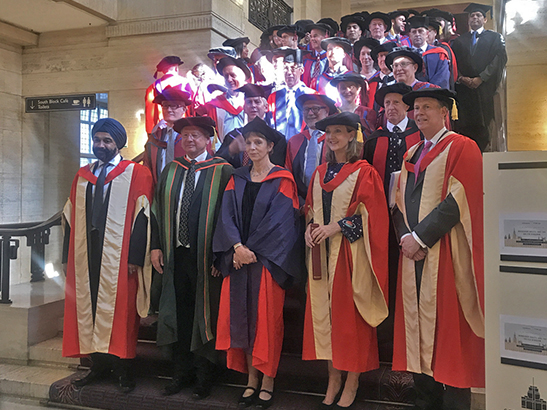
Image: Student shaking hands with ICR CEO, Professor Paul Workman at the 2018 ICR graduation ceremony. Credit: Nicola Tree
The Institute of Cancer Research award ceremony took place yesterday, to celebrate the hard work and achievements of our 2018 student graduates – and future generation of cancer researchers.
In the ceremony, 27 PhD graduates and ten MD(Res) graduates were commended for their hard work to contribute new knowledge to their chosen field of research –and set off on their path as independent researchers.
We also congratulated our seven students who graduated with a MSc in Oncology and 44 students who achieved other postgraduate awards in Oncology.
The award ceremony, held at The University of London’s Senate House, is one of the most important dates in the ICR’s calendar. Degrees were awarded by the University of London’s Vice Chancellor Professor Sir Adrian Smith.
Throughout the week of 9-15 July, the ICR is highlighting our academic excellence through a series of communication activities, including news items, blog posts, and videos.
Recognising outstanding achievements
ICR Chairman Luke Johnson presented three prizes for outstanding achievement to graduating PhD students Ilirjana Bajrami and Dr Joaquin Mateo Valderrama, and MD(Res) student Dr Francesco Sclafani.
Ilirjana’s research established that lung cancer drug crizotinib could be used to target ‘lobular’ breast cancers, using an approach known as synthetic lethality that attacks weaknesses in the tumour cells. The work has led to a Phase II clinical trial assessing the efficacy of crizotinib in women with advanced breast cancer.
Joaquin’s work has resulted in significant advances in the treatment and care of prostate cancer patients globally.
He helped lead the translational and clinical work of the trial assessing the antitumour activity of olaparib in prostate cancer and demonstrating the association between antitumour activity and DNA repair gene aberrations
Francesco’s work has been highly regarded and his research could have practice-changing results. He used MRI based tumour regression grade to predict outcome in patients with colorectal cancer, which could help identify patients who could benefit from additional therapies.
Professor Robert Huddart also awarded the Alan Horwich prize for outstanding achievement in MSc in Oncology to Lakshmi Harihar.
Lakshmi’s work during her MSc Oncology course demonstrated thorough analysis and rational exploration of a clinical data set, which could be taken forward as a potential clinical trial. She studied brain metastases in patients with advanced renal cell carcinoma, an area of limited treatment options.
Remarkable contributions
In addition to awarding degrees, the ceremony also provides an opportunity to thank and mark the achievements of people who have made crucial contributions to the ICR.
Former staff members Professor Sue Eccles, Mrs Liz Bennet and Mrs Bridget Carey-Watts were appointed Associates of the Institute for their long-standing service and commitment to the ICR. Between them they served 111 years at the ICR in the Division of Cancer Therapeutics, the ICR’s Secretariat and our HR department.
Ms Sandra Gallagher, a member of the ICR’s Animal Welfare and Ethical Review Body, Board of Trustees member Professor Nicholas Jones, and ICR committee members Mr Chris Molloy and Mr Michael Sales were also named Members of the Institute, recognising their role in the continuing mission of the ICR to make the discoveries that defeat cancer.
Professor Clare Isacke, Academic Dean at the ICR, said: “Our UK-leading programme of postgraduate training is at the heart of our work.
“Many of our graduates become leaders in their chosen careers and go on to have a national and international influence in the cancer research community, and ultimately in finding and developing new treatments for cancer.
“We hope that our students’ experiences at the ICR will help them to tackle the challenges they will face, and that they in turn will play their role in supporting the next generation of students.”
The ICR invited three individuals to receive Honorary Degrees to recognise and celebrate their dedication and outstanding achievements in cancer research and awareness.
Honorary graduates
The ICR also awards a number of honorary degrees each year. This year, former Cancer Research UK Chief Executive Sir Harpal Kumar, award-winning BBC journalist Victoria Derbyshire and eminent cancer researcher, Professor William Kaelin, were granted honorary degrees alongside the ICR’s graduating students.
Victoria Derbyshire’s honorary degree, a Doctor of Science (Medicine), acknowledges the impact she has had by sharing her personal experiences of being diagnosed and treated, which she documented on her YouTube channel, and in her diary ‘Dear Cancer, Love Victoria: A Mum’s Diary of Hope’.
The Victoria Derbyshire programme has worked closely with the ICR to highlight many research stories over the years to the public, most recently interviewing Professor Mel Greaves on his ground-breaking research revealing the likely cause of childhood leukaemia.
Sir Harpal Kumar was recognised for his achievements in helping to transform the cancer research sector, including helping to establish the Francis Crick Institute. He stood down in June as Chief Executive of Cancer Research UK, a position he had held since 2007.
Sir Harpal has a long list of achievements spanning his career, and has made a huge contribution to the broader cancer research landscape. His services to cancer research were acknowledged in the 2016 New Year Honours list, when he received his knighthood.
Outstanding research career
Professor William Kaelin, Associate Director, Basic Science, for the Dana-Farber/Harvard Cancer Center, was also given an Honorary Doctorate for his role in understanding how cancer cells sense oxygen levels.
Professor Kaelin’s outstanding research has led to a much greater understanding of the role of tumour suppressor genes in cancer, and the fundamental mechanism by which our cells sense and adapt to changes in oxygen availability – leading to new cancer treatments.
He is also a vocal and eloquent advocate of the importance of taking a highly rigorous approach to science.
The ICR Awards Ceremony takes place during the ICR’s Teaching Week, where we celebrate our learning and teaching excellence.
